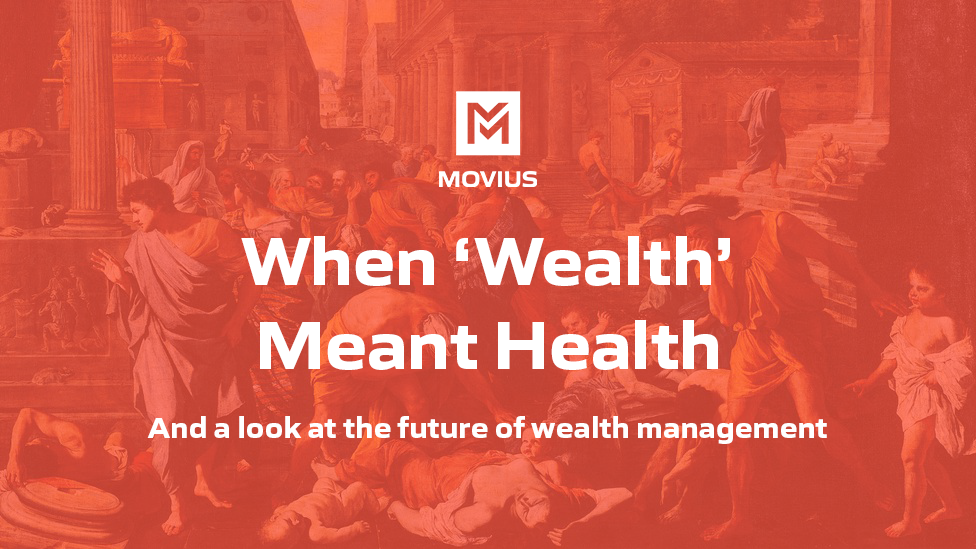This week, we peered into the past for inspiration for how wealth managers can find and grow client relationships given the new world of remote and hybrid work.
This year has changed many things for many people. Not least of all, wealth managers. Long reliant upon in-person meetups and deep, confidential relationships, many have had to grapple with managing relationships remotely.
But if this time has taught us all one thing, it’s that we’ve been thinking about “wealth” all wrong. If you’re going to build strong virtual ties with people you can no longer visit, it’s worth dialing the term “wealth” back to its original setting, to a time long ago when the word meant more than just “money.”
I Wish You Good Health
The word “wealth” rose to prominence in 14th century England during a pandemic we now know as the Bubonic plague. It comes from the old English “wele,” literally, “wellness” or “health.” It was only in the last century, during the age of industry that we stripped it of all the other meaning and construed it as simply possessing money.
Today, as we face another once-in-a-century plague, we’re rediscovering why all those anachronistic greetings like, “I wish you good health” or “Well met” were so focused on someone’s salubrity. (And why Victorians were positively mad about face covers and elbow-length gloves.) When you don’t have your health, not much else matters, because as they say, you can’t take it with you.
Reflecting on this older definition can give us a very different view on the role that wealth managers can now play in a world that has been shaken by an acute awareness of its own mortality. Nearly every person on earth has experienced the same worry, and possibly the same anguish of isolation. We are all of us forever changed. Let’s help our clients then understand that all that glitters is not just gold and “wealth” should also mean health, happiness, kinship, belonging, purpose, and so much more—money being just one path there.
Understanding this expanded meaning is key to becoming a truly valued and trusted wealth manager today, and doing it at a socially appropriate distance. For the change is only just beginning, and your clients will be sure of it.
The New Wealth Manager
Within just the past five years, the category of “wealth tech” has sprung into existence, ushered by conferences like Global WealthTech Summit, which our firm is sponsoring this year. But don’t let all the excitement over the technologies there convince you that software alone is how you’ll be able to make more fruitful connections in the near future. Because it isn’t.
Technology can be used to positive ends, but what good is being able to message clients en-masse if the trust that fosters the relationship is not there?
Tech helps, but it’s not an end-all-be-all. What matters is how you’re adapting and evolving your understanding of what people need from their wealth managers given the many changes and threats that lie ahead. Sixty-four percent of people are now fearful for their own health. Sixty-five percent are worried about their own personal job security.
This is of course compounded by all the trends that predated the pandemic, but which have accelerated—by some measures, by as much as seven years:
- Competition from robo investment and new entrants: Investment apps and new financial products from large retailers and CPG firms with no history of financial offerings are creating more competition and confusing investors.
- Women investors and the great wealth transfer: Tomorrow’s client may look very different. Over the next 30 years, an estimated $30 trillion will change hands from an older generation to a younger, says CAF America. At the same time, women will soon control a larger share of assets. (It is about time.)
- New, higher expectations: The smartphone revolution has taught everyone to expect quality digital services mostly for free. A reported 90% of Baby Boomers, 91% of Gen X, and 93% of millennials say that the fee structure is important when selecting an advisor.
- Remote and reduced travel: Today’s pandemic may fade but we’ll be forever changed. We’ve learned that remote work can work, and people will be more tolerant of not being able to meet face-to-face.
- Increased regulation: There’s been a 45% increase in the cost of non-compliance to firms within the last decade. Scrutiny over communications will only rise.
Amidst it all—the concerns over health and job security mixed with demands for convenience and self-serve digital interfaces—you can make a name for yourself as their guide. It’s a confoundingly complicated future and people want more than money advice. They want to know how their financial goals are related to their goals for their physical health, media consumption habits, and even moral health, or the ethics behind their investments.
You as a wealth manager can be all that to them, and an invaluable source of trusted information. And this is where wealth tech can play a helpful part.
You Can Be The Gateway to All Kinds of Wealth
Today, stressed people caring for children or parents don’t want to compose an email. And if they have a question, younger generations don’t want to be called. Each wants to communicate on their channels of choice, just like they would with a friend, over medium like WhatsApp and SMS text. To be that trusted wealth advisor, you have to be on their smartphone, where 45% of people look up health information and 82% of people manage their finances. Today, 85% of customers prefer receiving text messages over a phone call or an email yet only 10% of advisors text.
You can be a new wealth manager—one that recognizes that “wealth” means a lot more than just money. It’s an opportunity to reinvigorate your vocation and be even more valuable to your clients. And if that’s your intention, to make them truly wealthy, wealth tech can help you get there, and grow an even healthier relationship.
